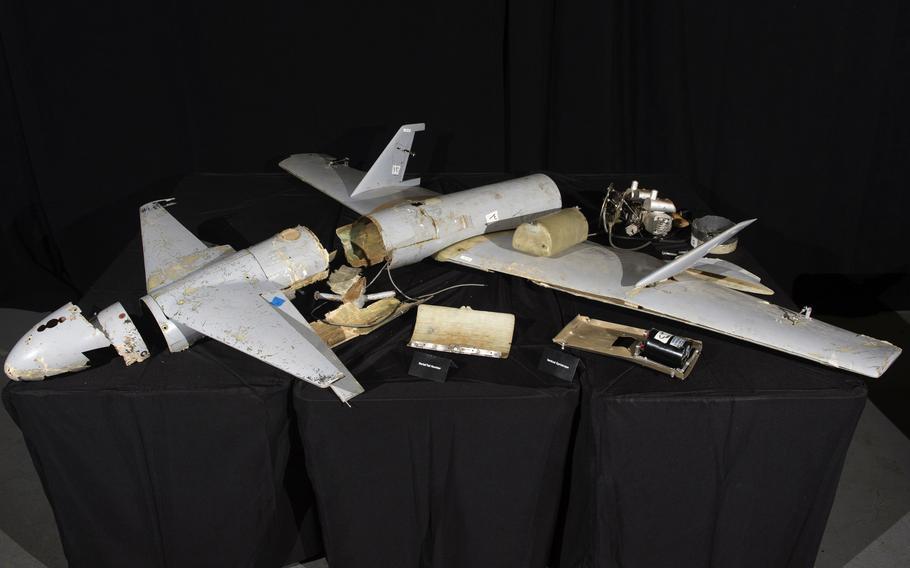
Components from an Iranian drone on display at Joint Base Anacostia-Bolling in Washington in 2018. (EJ Hersom/Department of Defense)
Iran has supplied Sudan’s army with combat drones, taking sides in a disastrous civil war fueled by proxies keen for Red Sea access that has displaced millions and risks destabilizing the wider region, according to senior Western officials.
Iran’s intervention in the nine-month conflict on the side of the military, which has lost swathes of territory to a paramilitary group allegedly backed by the United Arab Emirates, raises the stakes for the North African country already on the verge of famine. It also underscores the importance of Sudan’s 400-mile Red Sea coastline where the likes of China, Russia and Turkey are jockeying for access.
Iran providing drones and other material support to Sudan’s army is “widely accepted in the diplomatic community,” said Alan Boswell, Horn of Africa project director for the International Crisis Group. “Regaining an ally in Sudan, especially along the Red Sea, would be a major win for Iran but will spook other regional and Western powers.”
Sudan received shipments of the Mohajer-6, a single-engine unmanned aircraft manufactured in Iran by Quds Air Industries that carries precision-guided munitions, said three Western officials, requesting anonymity to divulge sensitive information. Analysts who examined satellite imagery confirmed the drone’s presence in the country.
The Mohajer-6 is capable of conducting air-to-surface attacks, electronic warfare and targeting on the battlefield, according to US officials. It’s unclear what impact they may have had in Sudan.
Arming Sudan would bolster Tehran’s military sway in the broader Middle East — where it supports groups ranging from Hamas in Gaza to Lebanon’s Hezbollah and the Houthis in Yemen — as well as its growing drone program. The US says Iran has already supplied Hezbollah, Hamas, Kata’ib Hezbollah in Iraq, the Houthis and Ethiopia’s army.
The move would also pit Iran against the UAE, which Sudan’s military, UN experts and Western diplomats say backs the Rapid Support Forces — the rival group now controlling many of the country’s major cities. Tehran and the Sudanese army reopened diplomatic ties in 2023 after a seven-year hiatus linked to Sudan’s role in a Saudi Arabia-led coalition that fought the Houthis in Yemen.
The US has accused Iran of providing Mohajer-6 drones to Russia in its war against Ukraine. Washington last year expanded its Iran-related sanctions, citing Tehran’s “continued, deliberate proliferation of UAVs enabling Russia, its proxies in the Middle East and other destabilizing actors.”
Iran says its defense exports have risen in recent years, but has repeatedly denied sending drones to Russia and says Ukraine hasn’t shown any evidence to prove the claim. Tehran also denies arming the Houthis, saying the group is strong enough to act alone. On Jan. 17, Foreign Minister Hossein Amirabdollahian said it’s not Iran’s responsibility if other countries copy Iranian drones.
Among the evidence proving the Mohajer-6’s presence in Sudan is a Jan. 9 satellite image of the UAV at the Wadi Sayyidna air base north of the capital, Khartoum, according to Wim Zwijnenburg, project leader of humanitarian disarmament at PAX, a Dutch organization seeking to foster peaceful societies.
The 10-meter wingspan and 7.5-meter length only match the Mohajer-6, Zwijnenberg, a drone expert, said in an interview. He also identified a radio antenna from a control center inside a truck on the airstrip as a common sight where the UAV is operated, and said footage shared on social media of the wreckage of a small aircraft shot down in January by RSF fighters clearly showed the tail wing of the drone.
Zwijnenburg documented Ethiopia’s use of Mohajer-6 drones in its war against the regional government in Tigray. Jakub Janovsky, an open source intelligence analyst, also confirmed the drone’s features matched that of a Mohajer-6.
A Sudanese army spokesman didn’t respond to requests for comment, nor did Iran’s Foreign Ministry or UN mission.
The UAE has been accused of supplying the rival RSF with military equipment, including drones. When a Sudanese army official publicly made the allegations last month the resulting feud led to the mutual expulsion of diplomats.
UN investigators have described as “credible” allegations the UAE has assisted the RSF with supplies from neighboring Chad. The UAE vehemently denies backing either side and says it’s dedicated to providing humanitarian relief and pushing for a permanent cease-fire.
With assistance from Arsalan Shahla and Patrick Sykes.